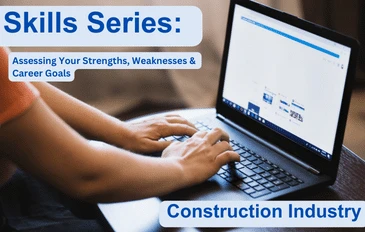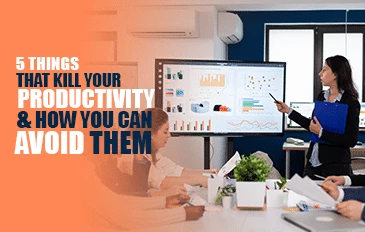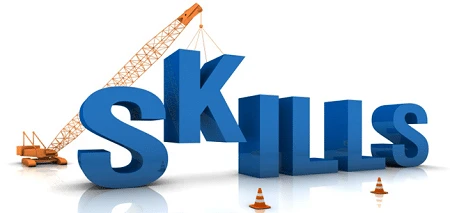Skills Series: Assessing Strengths, Weaknesses and Career Goals

Skills Series: Identifying Your Strengths, Weaknesses, and Career Goals
In the construction industry, it’s essential to have a clear understanding of your skills and interests, as well as your career goals, before embarking on a job search. By taking the time to assess your strengths and weaknesses and identify your career aspirations, you’ll be better equipped to find a job that’s the right fit for you.
In this post, we will explore various strategies and techniques for assessing your skills and interests, including self-reflection, career assessments, and seeking feedback from others. We will also discuss how to identify your career goals and develop a plan for achieving them.
Self-reflection
Self-reflection is an essential component of assessing your skills and interests. Before starting your job search, take some time to reflect on your experiences, skills, and interests. By asking yourself some important questions, you’ll be better equipped to identify your strengths and areas for improvement.
One helpful exercise is to create a list of your skills and experience. This can include your educational background, relevant work experience, and any certifications or training you’ve received. As you create this list, think about the specific tasks you performed in each role and the skills you used to complete them.
You should also consider your personal interests and preferences when it comes to work. Think about the type of work environment you thrive in. Do you prefer working independently or as part of a team? Do you prefer a fast-paced or more relaxed work environment? By considering these factors, you’ll be able to identify roles and companies that align with your interests and preferences.
Another important aspect of self-reflection is identifying your strengths and weaknesses. This can be a difficult exercise, as many people are hesitant to acknowledge their weaknesses. However, it’s essential to have an accurate understanding of your strengths and areas for improvement in order to succeed in the construction industry.
To identify your strengths, think about the tasks or activities that come naturally to you. What are you good at? What do others frequently compliment you on? You can also consider your past experiences, both in the construction industry and in other areas of your life, to help identify your strengths.
To identify your areas for improvement, consider the tasks or activities that you struggle with. What areas do you feel you could use more training or experience in? You can also ask for feedback from others to help identify areas where you could improve.
Career assessments
Career assessments can be a valuable tool for assessing your skills and interests. These assessments can help you identify your strengths and interests, as well as potential career paths that may be a good fit for you.
There are various types of career assessments available, including personality tests, aptitude tests, and interest inventories. Personality tests, such as the Myers-Briggs Type Indicator, can help you understand your personality type and how it relates to different career paths. Aptitude tests, such as the Strong Interest Inventory, can help you identify your natural abilities and skills. Interest inventories, such as the Holland Code, can help you identify your interests and how they relate to different careers.
When taking a career assessment, it’s important to keep in mind that no assessment can fully capture your skills and interests. However, these assessments can provide valuable insight and help guide your career exploration.
Feedback from others
Seeking feedback from others can also be a useful way to assess your skills and interests. Talk to your colleagues, friends, and family members to get their perspective on your strengths and weaknesses. You can also consider asking for feedback from past employers or mentors in the construction industry.
When seeking feedback, it’s important to be open-minded and receptive to constructive criticism. Remember that feedback is intended to help you improve and grow, and that everyone has areas for improvement.
Michael DeSafey is a leading executive recruiter for professionals in the construction, engineering, and environmental industries. He is currently the President of Webuild Staffing: www.webuildstaffing.com. To learn more about Michael, or to follow his blog, please visit www.michaeldesafey.com.
Category: Career Training, Construction, Interview And Job Search Tips, Jobs, Resume Writing
Five Things that Kill your Productivity – How to Avoid Them

Five Things that Kill your Productivity - How to Avoid Them
The construction, engineering, and environmental industries are above all about precision and staying organized. Your job is not complete until the project meets the blueprint of your design and there are no loose ends. To get to this point efficiently and effectively, it’s important to stay productive.
Productivity measures how much work you can do in a given period, or how many units of output you produce with a given amount of input. In other words, it measures how much work you can get done on any given day to complete your projects on time. Let’s talk about five things that can kill productivity, and what you can do to avoid them and get back on track.
Distractions
There’s a reason why productivity gurus like Tim Ferriss and Gary Vee talk about minimizing distractions at work—they can completely derail your day, not to mention your project timelines. Never underestimate the potential negative impact of a team member who can’t stay focused on their job. Distractions can include office chit-chat, noisy coworkers, lousy music, social media, and more. If your career requires you to communicate with clients, be sure to put parameters in place to minimize costly distractions. This will help you stay focused but also help the client stay focused on the critical task at hand.
Disorganization
A lack of organization can reduce productivity, and can also lead to safety hazards for construction, engineering, and environmental professionals. To stay organized, make sure that you have “a place for everything”: this means that everything from your computer to your tools has a place where it belongs. Be sure to put everything back in its place when you’re done so that it’s easy to find it the next time you need it. Also, use a calendar, planner, or project management software package to record your tasks, and you’ll never forget to do something again.
Lack of Communication
Good communication is paramount in any workplace. Whether in a project management context or in the field, it’s vital to communicate effectively with your team members to ensure that your clients are happy and your projects are running smoothly. This means that you’ll need to share the correct information promptly, so that there are no surprises. This can also prevent you from repeating tasks unnecessarily, helping you to stay on schedule and within your budget. When communicating with team members, make sure to do so in a way that makes the information easy to access. Giving someone a stack of papers will likely result in the important information being lost, or put down in the wrong place—use a digital tool instead, so you can search for and find the information quickly when it’s needed. Good communication also means listening as well as speaking; be sure to understand what’s being said and react appropriately.
Poor Working Environment
Nothing kills productivity as quickly as a poor working environment. Check your workspace’s temperature, cleanliness, and noise level to ensure you’re comfortable and can remain productive. If you’re in a poorly lit area, you won’t be able to see as clearly. If you’re in an area that’s messy or dirty, it can be distracting, and you might even get sick. If you’re in an area that’s too noisy, you won’t be able to focus on your task and will likely make more mistakes. Be sure to take care of these issues in your work environment so that you can concentrate on completing your work.
Incorrect Tools and Equipment
Using the wrong tools and equipment can reduce your productivity, and can even put your team members at risk. Be sure to know what tools you need to do your job and use them correctly. If you’re in construction, you don’t need to use the same hammer as a roofer—using the wrong tools can increase the time required to complete a job, and possibly lead to mistakes. If you’re in engineering, you need to make sure you’re using the right equipment for your field; this can range from computer software to survey equipment. Again, using the wrong equipment for your job can cause you to take too much time and make more mistakes. The resulting loss of money and time could put your entire project at risk.
Conclusion
Productivity is all about getting the most out of your day. This means you can complete your tasks and get them done on time. There are many things that can kill your productivity, including distractions, disorganization, lack of communication, a poor working environment, and incorrect tools and equipment. Be sure to avoid these five productivity killers so you can finish your work on time.
Michael DeSafey is a leading executive recruiter for professionals in the construction, engineering, and environmental industries. He is currently the President of Webuild Staffing: www.webuildstaffing.com. To learn more about Michael, or to follow his blog, please visit www.michaeldesafey.com.
What’s Your Motivation Style? Learn How To Leverage It

What’s Your Motivation Style? Learn How to Leverage It to Achieve your Career Goals
Do you know what motivates you to reach your objectives? Do you have an internal drive to move forward, or do you require external inspiration from others? Understanding your motivation style and knowing how best to utilize it is crucial for career success in the construction, engineering, and environmental sectors.
This blog provides career advice on intrinsic and extrinsic motivation, along with pointers for utilizing your motivational style to accomplish your professional objectives.
What are Intrinsic and Extrinsic Motivations? How do they Differ?
Personal interest or delight in an activity is the source of intrinsic motivation. Since it is independent of incentives from outside sources, intrinsic motivation frequently lasts longer than extrinsic motivation. If you are intrinsically driven, you are more likely to be emotionally invested in your work and persevere when facing difficulties. Intrinsically motivated people are often self-starters and need less direction from others.
Extrinsic motivation is derived from outside influences, such as incentives, penalties, or approval from others. People driven by external factors can require more oversight and direction from their employer to keep on track.
Occupational Examples of Intrinsic and Extrinsic Motivations
You might be curious about how extrinsic and intrinsic motivation interact at work. Let’s look at a few examples.
Intrinsic Motivation:
- You prefer working on difficult assignments, and you get a sense of satisfaction from finishing them.
- You have the internal drive to keep up with professional news and developments.
- When you complete a task to the highest standards, you take pride in your work and are satisfied.
Extrinsic Motivation:
- Your supervisor sets objectives for you to meet to earn a bonus or boost in salary.
- You put in a lot of effort to get the respect of your superiors or peers.
- You keep working outside of your normal work hours to complete a task, since you are aware of the repercussions if you don’t.
How to Use Your Personal Motivational Style to Reach Your Career Goals
If you have intrinsic motivation, you can use your initiative to volunteer for leadership positions or take on more duties at work. You may increase your chances of getting promoted by taking on more work and demonstrating your leadership skills to your superiors.
By exploring chances for professional growth or continuing education, you may also harness your intrinsic desire to become an authority in your field. You will be more prepared to assume leadership roles and develop your career if you increase your knowledge and abilities.
On the other hand, if you are extrinsically driven, you may use this quality to create externally validated objectives, such as securing a raise or a promotion. Although the inner drive is crucial, external variables like these can also serve as effective motivators to help you achieve your professional objectives.
Extrinsic motivation may also help you foster productive connections with your superiors and coworkers. Your chances of being promoted will increase if you establish good relationships with people in positions of authority.
Can Intrinsic and Extrinsic Motivation Styles Be Used Together?
It’s possible to utilize both internal and extrinsic motivation to accomplish your professional goals. Extrinsic motivation can offer benefits from the outside world that can help you to continue moving forward. You will be more likely to maintain your involvement in your job and your drive to attain your objectives if you pursue personally fulfilling and externally validated goals. In contrast, intrinsic motivation will keep you engaged in your task even when times are rough.
You can position yourself for success in any profession using a combination of intrinsic and extrinsic drives. For instance, you could be driven both by your (intrinsic) desire to master your area of specialization and your (extrinsic) desire to earn a higher wage. By combining these intrinsic and extrinsic drives, you can develop a well-rounded strategy for achieving your goals.
Additionally, you are more likely to persevere through tough times or difficult tasks if you are engaged in work that you find intriguing and challenging. However, if you also know there will be a benefit for finishing the project (such as a bonus or salary increase), this will provide you with additional incentive.
Conclusion
Regardless of what your own personal motivational style might be, there are ways to use it to further your career goals in the environmental, engineering, or construction sectors. Extrinsic motivation might offer you external incentives and recognition, while intrinsic motivation will help you remain motivated and engaged in your task. Combining intrinsic and extrinsic motivation can help you develop a well-rounded strategy for achieving your goals.
Michael DeSafey is a leading executive recruiter for professionals in the construction, engineering, and environmental industries. He is currently the President of Webuild Staffing: www.webuildstaffing.com. To learn more about Michael, or to follow his blog, please visit www.michaeldesafey.com.
Category: Career Training, Construction, Engineering, Environmental
The Top 10 Skills That Will Be In Demand By Employers In The Future

The Top 10 Skills That Will Be In Demand By Employers In The Future
By the year 2020, employers are going to require more from their workers than ever before. Having the essential skills necessary to succeed in the construction, engineering, and environmental industries will be an absolute necessity to advance within the industry.
Employers have stated capable employees that have a mix of skill sets fulfilling a range of needs within their organizations will be the most valuable to them. Below are the top ten essential skills professionals will need to master.
Creativity – Creativity is and will still be a relevant and important skill that will allow for innovation within technology arena, as well as, assuring projects are completed successfully.
Negotiation – Skills in negotiation are still uniquely human and will be highly valued in management jobs similar to project managers, superintendents and executive directors. The abilities to negotiate contracts, mange subcontractors and interact / communicate with clients at a senior level is currently and will be even more highly desired by employers.
Critical Thinking – Automated processes, like robots, have not caught up with the way humans use different approaches to evaluate certain strengths and weaknesses to tackle a problem. The ability to critically think through an issue and produce a desire result is essential.
People Management – The ability to manage people, have an eye for finding the right individuals for a job and motivating them will be a crucial skill in 2020.
Coordinating – Knowing how to work with others to get a job done is essential in today’s marketplace. It will be even more essential in the future.
Emotional Intelligence – Companies will want to hire employees that have a strong level of emotional intelligence. People that understand how to interact with others and why they react the way they do to anticipate issues in advance.
Problem Solving Skills – Arguably the most important skill to have in 2020, the ability to solve complex problems will be a highly sought after skill. With all the information available in today’s environment, individuals that can leverage information and apply it to solve real world problems is one of the most difficult skills to master.
Strong Decision Makers – Having the ability to analyze information and/or a situation and make a decision will be an important role in the job field of 2020. This is especially true as companies are growing and need individuals that can make the right decisions consistently.
Service Orientation– Service orientation falls under the social skills category, but warrants its own spot on the list. Service orientation pertains to helping others, whether it be customers or employees, through social interaction to achieve a mutual goal will be essential and highly sought after by employers.
Cognitive Abilities – Thinking about multiple concepts simultaneously is a skill set not high on the list in 2015, but will be in the coming years. The ability to bring all the above skills together use logic, problem solving, and creativity to lead and solve problems will be the most essential skill desired by employers in 2020.
Michael DeSafey is a leading executive recruiter for professionals in the construction, engineering and environmental industries. He is currently the President of Webuild Staffing www.webuildstaffing.com . To learn more about Michael or to follow his Blog please visit www.michaeldesafey.com
